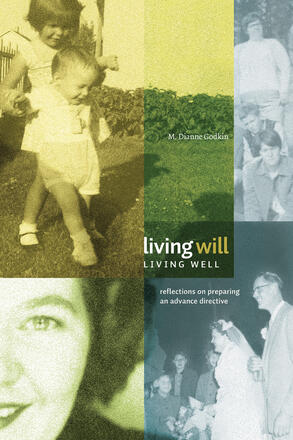
Description
Using the voices of ordinary people, clinical ethicist and nurse Dianne Godkin explores the end-of-life issues and emotions that arise when an individual sets out to prepare an advance directive (living will). Conversations with study participants, and the composite character of Alice, are forthright, practical, and uplifting. Written for individuals and their families who are thinking about creating an advance directive, and for healthcare providers who interact with these individuals, this book provides readers with a deeper understanding of the experience of preparing for the end of life.
Reviews
"Godkin draws from her nursing experience and research in her advocacy of advanced directives. The five substantive chapters in this concise, clearly written volume are titled 'Protecting Self and Others,' 'Facing One's Mortality,' 'Talking about Death,' 'Choosing an Agent,' and 'Getting It Done.' In contrast with many such works, this volume is practical and concrete, noting that the general public became aware of the concept of advaced directives through legal cases like those of Karen Ann Quinlan and Terry Schiavo. These cases highlighted living wills' potential for protecting patient autonomy and supporting family, friends, and caregivers in making medical decisions for dying patients. To illustrate her message, Godkin introduces two fictitious individuals dying of leukemia: 'Alice,' 84, learns about advanced directives from a church workshop, prepares for her own death by preparing a legacy scrapbook, and dies peacefully in accord with her expressed wishes; and 'Martha,' 65. Godkin, a young nurse, is called in as Martha is dying, and is horrified by the quasi-violence of medical efforts to resuscitate Martha before she is 'efficiently pronounced dead.' Appendixes include 'Guiding Interview Questions,' 'Sample Advanced Directives,' and 'Educational Resources.' Valuable for health facility patients, staff, and visitors." H. J. John, Choice, April 2009
"This text sets out the matters to be considered and done in preparation for departure from this mortal coil. The highlight is the sample directives that will assist the reader in his or her testamentary decisions. A useful book for trial lawyers who have reached 65 years of age." Ronald F. MacIsaac, The Saskatchewan Advocate, December 2008
"No one is immortal, and the best way to deal with the unfortunate is preparation. "Living Will, Living Well" is a guide to responsibly dealing with the event of death. Aimed at those in their later years, the book speaks of the importance of a living will and how the document isn't enough. "Living Will" offers advice on encouraging communication with loved ones and friends, assistance in dealing with the legal paperwork of wills and other complications that arise, and dealing with oneself after a loved one has passed on. "Living Will" is a solid compendium of knowledge on one's own death, and should be highly considered by those who don't want complications for themselves or their loved ones." Internet Bookwatch, Midwest Book Review, Nov. 2008
"Minimally, the "publish or perish" world of the academy expects that the contents of doctoral dissertations will be mined for conference papers and/or articles in refereed journals. The academic ideal, however, is the dissertation's transformation into a book, something that Godkin, currently Regional Ethicist with Trillium Health Centre in Mississauga and a University of Toronto assistant professor, has done with "Apprehending Death: The Older Adult's Experience of Preparing an Advance Directive," her 2002 dissertation completed at the University of Alberta's Faculty of Nursing. Readers seeking a how-to book on preparing their own living will, aka an advance directive, will eventually get that information, but Godkin's doctoral research was more concerned about the process that seniors used in arriving at the creation of a living will than she was in its exact contents. Drawing heavily from the structure and content of chapters 4-8 of her dissertation, Godkin explores five themes which serve as the book's chapter titles: "Protecting Self and Others"; "Facing One's Mortality"; "Talking about Death"; "Choosing an Ally"; and "Getting It Done." In her study, Godkin interviewed 15 seniors whose reflections on preparing an advance directive are given voice through the narration of Godkin's composite creation, Alice Dawson, 84, whose "conversations" appear in italics while Godkin's analysis is in regular print. The book concludes with an eight-page Reference List and four appendices, with one being her interview questions, the second a "Sample Advance Directive," and the final two "Legislative Guidelines" and "Educational Resources." Godkin saw three audiences for Living Will, Living Well: individuals, especially older adults, who are considering preparing an advance directive; their family members or friends who would play a supportive role, including being the ally who would endeavour to ensure that the advance directive's terms were actualized; and health care providers. Godkin believes members of the last group because they see their goal as preserving life, often find themselves in conflict with living wills and, therefore, need to become better informed. Though the book is generally quite readable, given that two of the audiences are just average Canadians, Godkin needed to abandon some of the academic writing style, especially the reference citations within the text. Recommended." - Dave Jenkinson, University of Manitoba